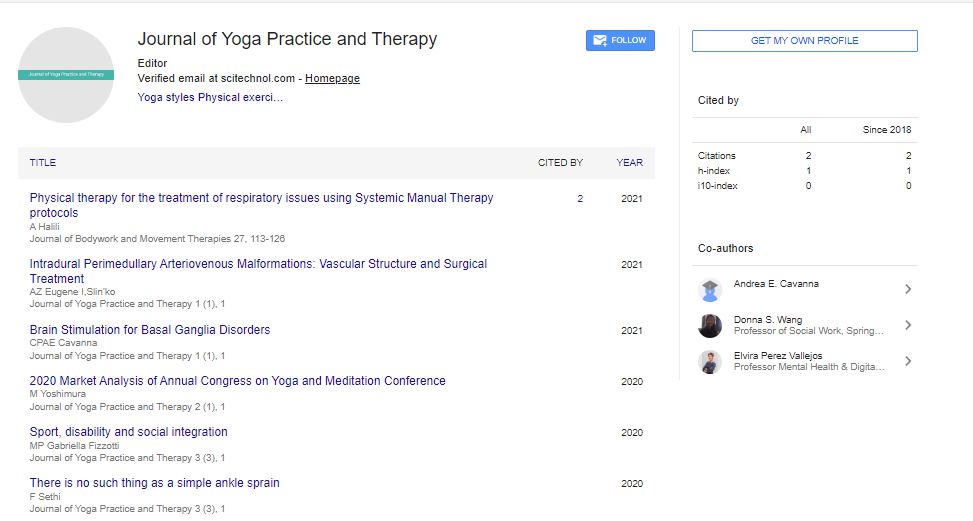Opinion Article, J Yoga Pract Ther Vol: 6 Issue: 2
Embracing Emotional Balance in Yoga Therapy for Anxiety and Depression
Nandini Rao*
1Department of Yoga and Life Sciences, Swami Vivekananda Yoga Anushandhana Samsthana, Bangalore, India
*Corresponding Author: Nandini Rao,
Department of Yoga and Life Sciences,
Swami Vivekananda Yoga Anushandhana Samsthana, Bangalore, India
E-mail: nand.ini12@gmail.com
Received date: 29 May, 2023, Manuscript No. JYPTY-23-107050;
Editor assigned date: 31 May, 2023, PreQC No. JYPTY-23-107050 (PQ);
Reviewed date: 14 June, 2023, QC No. JYPTY-23-107050;
Revised date: 21 June, 2023, Manuscript No. JYPTY-23-107050 (R);
Published date: 28 June, 2023, DOI: 10.4172/jypty.1000125
Citation: Rao N (2023) Embracing Emotional Balance in Yoga Therapy for Anxiety and Depression. Int J Yoga Therap 6:2.
Description
Anxiety and depression are among the most prevalent mental health challenges faced by individuals today. The toll they take on emotional well-being and overall quality of life is significant. Traditional treatments often include therapy and medication, but complementary approaches like yoga therapy have emerged as valuable tools in managing these conditions. Yoga therapy, with its focus on integrating mind, body, and breath, offers a unique pathway to embracing emotional balance for those struggling with anxiety and depression.
Mind-body connection in yoga therapy
Yoga therapy recognizes the intrinsic connection between the mind and body. Unlike conventional treatments that may focus solely on addressing symptoms, yoga therapy delves into the root causes of anxiety and depression, recognizing that emotional disturbances can manifest as physical tension and discomfort.
Through the practice of yoga asanas (poses) and pranayama (breath control), individuals learn to regulate their physical responses to stress and anxiety. Gentle, flowing movements help release tension stored in the body, developing a sense of ease and lightness. Pranayama techniques, such as deep belly breathing, activate the parasympathetic nervous system, promoting relaxation and reducing the fight-or-flight response.
By addressing both the physical and mental aspects of these conditions, yoga therapy provides a comprehensive approach to emotional balance.
Cultivating mindfulness to manage anxiety
Mindfulness, a fundamental component of yoga therapy, is an effective tool for managing anxiety. Anxiety often stems from excessive worry about the future or ruminating over past events. Mindfulness brings individuals into the present moment, breaking the cycle of anxious thoughts and fostering a sense of calm.
In yoga therapy sessions, individuals are guided through mindfulness practices, such as body scans and breath awareness. These exercises redirect attention away from racing thoughts and into the sensations of the present moment.
With consistent practice, individuals develop greater awareness of their thought patterns, allowing them to identify triggers and respond to anxiety with a sense of detachment and non-judgment.
Nurturing emotional release and expression
Yoga therapy develops a safe space for emotional release and expression. For individuals with anxiety and depression, emotions can become suppressed, leading to further distress and discomfort. Yoga therapy encourages individuals to acknowledge and express their emotions in a supportive environment.
Through specific yoga poses that target areas of emotional tension, individuals may experience a sense of catharsis. Gentle backbends, for example, can help release pent-up emotions stored in the heart and chest area.
Additionally, guided meditation and relaxation techniques allow individuals to connect with their emotions without judgment or fear. This process fosters emotional resilience and empowers individuals to navigate their emotional landscapes with greater ease.
Finding solace in yoga meditation
Meditation is a cornerstone of yoga therapy for anxiety and depression. Regular meditation practice helps calm the mind and cultivate inner peace. For individuals experiencing the overwhelming nature of anxiety or the persistent cloud of depression, meditation offers a respite from the chaos of the mind.
Yoga therapists introduce different meditation techniques, such as focused attention (concentration) meditation and loving-kindness meditation. The former helps individuals develop a single-pointed focus, reducing mental distractions, while the latter cultivates feelings of compassion and connectedness.
Incorporating meditation into daily life empowers individuals to develop a mental sanctuary, a space where they can retreat when the pressures of anxiety or depression become overwhelming.
Building emotional resilience through yoga therapy
Emotional resilience refers to the ability to adapt to challenging situations and bounce back from adversity. Yoga therapy fosters emotional resilience by helping individuals embrace vulnerability and imperfection while cultivating self-compassion.
In yoga therapy sessions, individuals are encouraged to practice self-compassion and let go of self-criticism. The practice of yoga teaches that progress is not linear, and each day on the mat may bring different challenges and triumphs.
By embracing these lessons, individuals learn to navigate the ups and downs of life with greater grace and resilience. They develop a greater sense of self-awareness and self-acceptance, fostering emotional balance even in the face of uncertainty.
Conclusion
Yoga therapy offers a holistic and empowering approach to managing anxiety and depression. By integrating the mind, body, and breath, yoga therapy fosters emotional balance and resilience in individuals facing these challenges.
Through mindfulness, emotional release, meditation, and selfcompassion, individuals discover the tools to embrace emotional equilibrium. Yoga therapy empowers them to navigate the complexities of anxiety and depression with greater ease and inner peace. As the world recognizes the importance of mental health and well-being, yoga therapy emerges as a powerful and transformative ally for those seeking to embrace emotional balance and reclaim their lives from the grip of anxiety and depression. With the guidance of skilled yoga therapists, individuals can find solace, empowerment, and a renewed sense of hope on their journey toward emotional wellness.
 Spanish
Spanish  Chinese
Chinese  Russian
Russian  German
German  French
French  Japanese
Japanese  Portuguese
Portuguese  Hindi
Hindi 